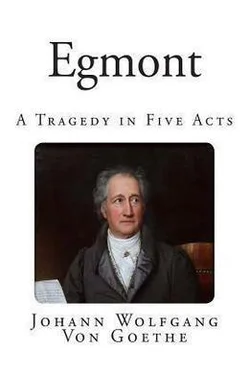Johann von Goethe - Egmont
Здесь есть возможность читать онлайн «Johann von Goethe - Egmont» весь текст электронной книги совершенно бесплатно (целиком полную версию без сокращений). В некоторых случаях можно слушать аудио, скачать через торрент в формате fb2 и присутствует краткое содержание. Год выпуска: 2015, Издательство: epubBooks Classics, Жанр: Драматургия, на английском языке. Описание произведения, (предисловие) а так же отзывы посетителей доступны на портале библиотеки ЛибКат.
- Название:Egmont
- Автор:
- Издательство:epubBooks Classics
- Жанр:
- Год:2015
- ISBN:нет данных
- Рейтинг книги:4 / 5. Голосов: 1
-
Избранное:Добавить в избранное
- Отзывы:
-
Ваша оценка:
- 80
- 1
- 2
- 3
- 4
- 5
Egmont: краткое содержание, описание и аннотация
Предлагаем к чтению аннотацию, описание, краткое содержание или предисловие (зависит от того, что написал сам автор книги «Egmont»). Если вы не нашли необходимую информацию о книге — напишите в комментариях, мы постараемся отыскать её.
Egmont — читать онлайн бесплатно полную книгу (весь текст) целиком
Ниже представлен текст книги, разбитый по страницам. Система сохранения места последней прочитанной страницы, позволяет с удобством читать онлайн бесплатно книгу «Egmont», без необходимости каждый раз заново искать на чём Вы остановились. Поставьте закладку, и сможете в любой момент перейти на страницу, на которой закончили чтение.
Интервал:
Закладка:
All. Hurrah, for the great Egmont! Hurrah! Hurrah!
Jetter. Had they but appointed him Regent, instead of Margaret of Parma!
Soest. Not so! Truth is truth! I'll not hear Margaret abused. Now it is my turn. Long live our gracious lady!
All. Long life to her!
Soest. Truly, there are excellent women in that family. Long live the Regent!
Jetter. Prudent is she, and moderate in all she does; if she would only not hold so fast and stiffly with the priests. It is partly her fault, too, that we have the fourteen new mitres in the land. Of what use are they, I should like to know? Why, that foreigners may be shoved into the good benefices, where formerly abbots were chosen out of the chapters! And we're to believe it's for the sake of religion. We know better. Three bishops were enough for us; things went on decently and reputably. Now each must busy himself as if he were needed; and this gives rise every moment to dissensions and ill–will. And the more you agitate the matter, so much the worse it grows. (They drink.)
Soest. But it was the will of the king; she cannot alter it, one way or another.
Jetter. Then we may not even sing the new psalms; but ribald songs, as many as we please. And why? There is heresy in them, they say, and heaven knows what. I have sung some of them, however; they are new, to be sure, but I see no harm in them.
Buyck. Ask their leave, forsooth! In our province, we sing just what we please. That's because Count Egmont is our stadtholder, who does not trouble himself about such matters. In Ghent, Ypres, and throughout the whole of Flanders, anybody sings them that chooses. (Aloud to Ruysum.) There is nothing more harmless than a spiritual song—Is there, father?
Ruysum. What, indeed! It is a godly work, and truly edifying.
Jetter. They say, however, that they are not of the right sort, not of their sort, and, since it is dangerous, we had better leave them alone. The officers of the Inquisition are always lurking and spying about; many an honest fellow has already fallen into their clutches. They had not gone so far as to meddle with conscience! If they will not allow me to do what I like, they might at least let me think and sing as I please.
Soest. The Inquisition won't do here. We are not made like the Spaniards, to let our consciences be tyrannized over. The nobles must look to it, and clip its wings betimes.
Jetter. It is a great bore. Whenever it comes into their worships' heads to break into my house, and I am sitting there at my work, humming a French psalm, thinking nothing about it, neither good nor bad—singing it just because it is in my throat;—forthwith I'm a heretic, and am clapped into prison. Or if I am passing through the country, and stand near a crowd listening to a new preacher, one of those who have come from Germany; instantly I'm called a rebel, and am in danger of losing my head! Have you ever heard one of these preachers?
Soest. Brave fellows! Not long ago, I heard one of them preach in a field, before thousands and thousands of people. A different sort of dish he gave us from that of our humdrum preachers, who, from the pulpit, choke their hearers with scraps of Latin. He spoke from his heart; told us how we had till now been led by the nose, how we had been kept in darkness, and how we might procure more light;—ay, and he proved it all out of the Bible.
Jetter. There may be something in it. I always said as much, and have often pondered over the matter. It has long been running in my head.
Buyck. All the people run after them.
Soest. No wonder, since they hear both what is good and what is new.
Jetter. And what is it all about? Surely they might let every one preach after his own fashion.
Buyck. Come, sirs! While you are talking, you; forget the wine and the Prince of Orange.
Jetter. We must not forget him. He's a very wall of defence. In thinking of him, one fancies, that if one could only hide behind him, the devil himself could not get at one. Here's to William of Orange! Hurrah!
All. Hurrah! Hurrah!
Soest. Now, grey–heard, let's have your toast.
Ruysum. Here's to old soldiers! To all soldiers! War for ever!
Buyck. Bravo, old fellow. Here's to all soldiers. War for ever!
Jetter. War! War! Do ye know what ye are shouting about? That it should slip glibly from your tongue is natural enough; but what wretched work it is for us, I have not words to tell you. To be stunned the whole year round by the beating of the drum; to hear of nothing except how one troop marched here, and another there; how they came over this height, and halted near that mill; how many were left dead on this field, and how many on that; how they press forward, and how one wins, and another loses, without being able to comprehend what they are fighting about; how a town is taken, how the citizens are put to the sword, and how it fares with the poor women and innocent children. This is a grief and a trouble, and then one thinks every moment, "Here they come! It will be our turn next."
Soest. Therefore every citizen must be practised in the use of arms.
Jetter. Fine talking, indeed, for him who has a wife and children. And yet I would rather hear of soldiers than see them.
Buyck. I might take offence at that.
Jetter. It was not intended for you, countryman. When we got rid of the Spanish garrison, we breathed freely again.
Soest. Faith! They pressed on you heavily enough.
Jetter. Mind your own business.
Soest. They came to sharp quarters with you.
Jetter. Hold your tongue.
Soest. They drove him out of kitchen, cellar, chamber—and bed. (They laugh.)
Jetter. You are a blockhead.
Buyck. Peace, sirs! Must the soldier cry peace? Since you will not hear anything about us, let us have a toast of your own—a citizen's toast.
Jetter. We're all ready for that! Safety and peace!
Soest. Order and freedom!
Buyck. Bravo! That will content us all.
(They ring their glasses together, and joyously repeat the words, but in such a manner that each utters a different sound, and it becomes a kind of chant. The old man listens, and at length joins in.)
All. Safety and peace! Order and freedom!
Scene II
Palace of the Regent
Margaret of Parma (in a hunting dress). Courtiers, Pages, Servants
Regent. Put off the hunt, I shall not ride to–day. Bid Machiavel attend me.
[Exeunt all but the Regent.
The thought of these terrible events leaves me no repose! Nothing can amuse, nothing divert my mind. These images, these cares are always before me. The king will now say that these are the natural fruits of my kindness, of my clemency; yet my conscience assures me that I have adopted the wisest, the most prudent course. Ought I sooner to have kindled, and spread abroad these flames with the breath of wrath? My hope was to keep them in, to let them smoulder in their own ashes. Yes, my inward conviction, and my knowledge of the circumstances, justify my conduct in my own eyes; but in what light will it appear to my brother! For, can it be denied that the insolence of these foreign teachers waxes daily more audacious? They have desecrated our sanctuaries, unsettled the dull minds of the people, and conjured up amongst them a spirit of delusion. Impure spirits have mingled among the insurgents, horrible deeds have been perpetrated, which to think of makes one shudder, and of these a circumstantial account must be transmitted instantly to court. Prompt and minute must be my communication, lest rumour outrun my messenger, and the king suspect that some particulars have been purposely withheld. I can see no means, severe or mild, by which to stem the evil. Oh, what are we great ones on the waves of humanity? We think to control them, and are ourselves driven to and fro, hither and thither.
Читать дальшеИнтервал:
Закладка:
Похожие книги на «Egmont»
Представляем Вашему вниманию похожие книги на «Egmont» списком для выбора. Мы отобрали схожую по названию и смыслу литературу в надежде предоставить читателям больше вариантов отыскать новые, интересные, ещё непрочитанные произведения.
Обсуждение, отзывы о книге «Egmont» и просто собственные мнения читателей. Оставьте ваши комментарии, напишите, что Вы думаете о произведении, его смысле или главных героях. Укажите что конкретно понравилось, а что нет, и почему Вы так считаете.












